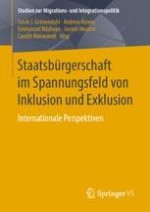2019 | OriginalPaper | Chapter
11. Inside Participation, Outside Citizenship: What We Can Learn about Citizenship from Undocumented Youth
Author : Elizabeth Benedict Christensen
Published in: Staatsbürgerschaft im Spannungsfeld von Inklusion und Exklusion
Publisher: Springer Fachmedien Wiesbaden
Activate our intelligent search to find suitable subject content or patents.
Select sections of text to find matching patents with Artificial Intelligence. powered by
Select sections of text to find additional relevant content using AI-assisted search. powered by
